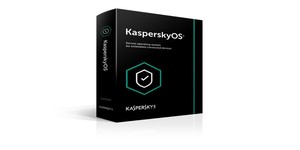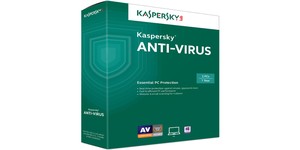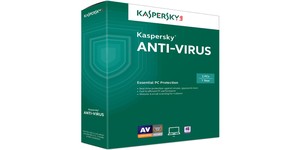Kaspersky attacks Microsoft over alleged Defender monopoly
November 14, 2016 | 10:27
Companies: #kaspersky #microsoft

Eponymous anti-virus firm founder Eugene Kaspersky has accused Microsoft of anticompetitive behaviour following the company's decision to bundle its Windows Defender technology with the Windows 10 operating system.
Microsoft has long taken the approach of giving its market-leading operating systems as much capability as possible, and each launch typically comes with an outcry of complaints from competitors working in the same field. Most famously, Microsoft was forced to display a 'browser ballot' screen in the European Union in order to give Windows 8 users more choice over how they accessed the web rather than simply loading the default Internet Explorer browser - a legally-mandated requirement which ran from 2010 and expired in 2014.
Now Eugene Kaspersky, founder of anti-virus and security specialist Kaspersky Lab, is claiming Microsoft is up to its old anticompetitive tricks again. 'When you upgrade to Windows 10, Microsoft automatically and without any warning deactivates all ‘incompatible’ security software and in its place installs… you guessed it – its own Defender antivirus,' Kaspersky claimed in a blog post entitled That's It. I've Had Enough!. 'But what did it expect when independent developers were given all of one week before the release of the new version of the OS to make their software compatible?
'Even if users have compatible protection from an independent developer already installed, Defender appears with an alarming window. It fairly shouts that Defender is switched off, because you’ve some other AV installed. There’s a big juicy Defender ‘Turn on’ button too. Of course, many users will be inclined to press this button: ‘well, it’s from Microsoft – the people who make the OS; must be good; no harm in turning it on for sure’. In fact, pressing the big juicy button will also deactivate your existing AV. But a user only gets to find this out from a tiny text in a pop-up window.'
Kaspersky has also pointed to other changes in the way Windows operates with third-party security software as evidence that Microsoft is stifling competition, claiming that licence renewal notifications become hidden in the Windows Security Centre - causing users to fail to renew, which makes Windows Defender take over - and a limit of the number of antivirus packages that can be installed at once, causing testing a trial version of a third-party package to frequently disable all third-party anti-virus software in favour of Windows Defender.
Kaspersky's company has, accordingly, filed complaints with monopoly bodies in nations including the EU and Russia accusing Microsoft of anticompetitive behaviour requesting that third-party vendors are given longer to test their software's compatibility with new operating system releases, to flag incompatible software pre-upgrade and alert the user to install a newer release post-upgrade rather than simply disabling the software, and to disable automatic activation of Windows Defender over third-party software without the user's express consent.
Microsoft has not responded to Kaspersky's claims, nor his company's complaints to legal bodies. Kaspersky himself stood accused of sabotaging rivals' software last year, a charge which he strongly denied.
Microsoft has long taken the approach of giving its market-leading operating systems as much capability as possible, and each launch typically comes with an outcry of complaints from competitors working in the same field. Most famously, Microsoft was forced to display a 'browser ballot' screen in the European Union in order to give Windows 8 users more choice over how they accessed the web rather than simply loading the default Internet Explorer browser - a legally-mandated requirement which ran from 2010 and expired in 2014.
Now Eugene Kaspersky, founder of anti-virus and security specialist Kaspersky Lab, is claiming Microsoft is up to its old anticompetitive tricks again. 'When you upgrade to Windows 10, Microsoft automatically and without any warning deactivates all ‘incompatible’ security software and in its place installs… you guessed it – its own Defender antivirus,' Kaspersky claimed in a blog post entitled That's It. I've Had Enough!. 'But what did it expect when independent developers were given all of one week before the release of the new version of the OS to make their software compatible?
'Even if users have compatible protection from an independent developer already installed, Defender appears with an alarming window. It fairly shouts that Defender is switched off, because you’ve some other AV installed. There’s a big juicy Defender ‘Turn on’ button too. Of course, many users will be inclined to press this button: ‘well, it’s from Microsoft – the people who make the OS; must be good; no harm in turning it on for sure’. In fact, pressing the big juicy button will also deactivate your existing AV. But a user only gets to find this out from a tiny text in a pop-up window.'
Kaspersky has also pointed to other changes in the way Windows operates with third-party security software as evidence that Microsoft is stifling competition, claiming that licence renewal notifications become hidden in the Windows Security Centre - causing users to fail to renew, which makes Windows Defender take over - and a limit of the number of antivirus packages that can be installed at once, causing testing a trial version of a third-party package to frequently disable all third-party anti-virus software in favour of Windows Defender.
Kaspersky's company has, accordingly, filed complaints with monopoly bodies in nations including the EU and Russia accusing Microsoft of anticompetitive behaviour requesting that third-party vendors are given longer to test their software's compatibility with new operating system releases, to flag incompatible software pre-upgrade and alert the user to install a newer release post-upgrade rather than simply disabling the software, and to disable automatic activation of Windows Defender over third-party software without the user's express consent.
Microsoft has not responded to Kaspersky's claims, nor his company's complaints to legal bodies. Kaspersky himself stood accused of sabotaging rivals' software last year, a charge which he strongly denied.

MSI MPG Velox 100R Chassis Review
October 14 2021 | 15:04








Want to comment? Please log in.